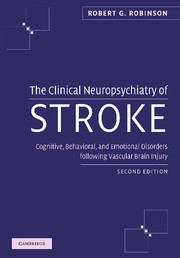 The Clinical Neuropsychiatry of Stroke
The Clinical Neuropsychiatry of Stroke Book contents
- Frontmatter
- Contents
- Preface
- Part I Introduction
- Part II Poststroke depression
- 5 Diagnosis of depression
- 6 Prevalence of depressive disorders
- 7 Phenomenology and specificity of depressive symptoms
- 8 Natural course of depression
- 9 Delayed-onset depression
- 10 Relationship to lesion location
- 11 Relationship of depression to cerebral dominance and structural asymmetries
- 12 Relationship of depression to bilateral hemisphere brain injury
- 13 Relationship of depression to physical impairment
- 14 Relationship to cognitive impairment and treatment
- 15 Relationship of aphasia to depression
- 16 Relationship of depression to social functioning
- 17 Relationship to premorbid risk factors
- 18 Mortality and treatment
- 19 Suicidal thoughts and plans
- 20 Biological markers
- 21 Mechanisms of poststroke depression
- 22 Treatment of poststroke depression
- 23 Prevention of poststroke depression
- Part III Poststroke mania
- Part IV Poststroke anxiety disorders
- Part V Other poststroke disorders
- Index
20 - Biological markers
from Part II - Poststroke depression
Published online by Cambridge University Press: 01 October 2009
- Frontmatter
- Contents
- Preface
- Part I Introduction
- Part II Poststroke depression
- 5 Diagnosis of depression
- 6 Prevalence of depressive disorders
- 7 Phenomenology and specificity of depressive symptoms
- 8 Natural course of depression
- 9 Delayed-onset depression
- 10 Relationship to lesion location
- 11 Relationship of depression to cerebral dominance and structural asymmetries
- 12 Relationship of depression to bilateral hemisphere brain injury
- 13 Relationship of depression to physical impairment
- 14 Relationship to cognitive impairment and treatment
- 15 Relationship of aphasia to depression
- 16 Relationship of depression to social functioning
- 17 Relationship to premorbid risk factors
- 18 Mortality and treatment
- 19 Suicidal thoughts and plans
- 20 Biological markers
- 21 Mechanisms of poststroke depression
- 22 Treatment of poststroke depression
- 23 Prevention of poststroke depression
- Part III Poststroke mania
- Part IV Poststroke anxiety disorders
- Part V Other poststroke disorders
- Index
Summary
In spite of brief periods of enthusiasm about the potential diagnostic utility or etiological insights to be gained from neuroendocrine tests associated with depression, there has been an overall lack of success of neuroendocrine testing in primary depression. Similarly, among patients with poststroke depression, neuroendocrine tests have not been successful in establishing either an alternative method of diagnosing poststroke depression or illuminating neuroendocrine abnormalities which may contribute to the mechanism of poststroke depression.
Since the early 1960s, it has been known that patients with depression secrete an excess amount of cortisol (Gibbons and McHugh 1962; Sachar et al. 1973). The dexamethasone suppression test (DST) has been used extensively to study states of hypercortisolism (Carroll et al. 1981). Patients given 1 mg of dexamethasone orally will suppress serum cortisol secretion over the following 24 h. In a significant number of patients with primary major depression, especially the melancholic form of depression, there is a failure to suppress serum cortisol following dexamethasone administration. This lack of suppression is referred to as a positive DST response. Sensitivity of a positive DST in identifying patients with melancholic depression is determined by dividing the number of DST-positive depressed patients as a percentage of the total number of depressed patients.
- Type
- Chapter
- Information
- The Clinical Neuropsychiatry of StrokeCognitive, Behavioral and Emotional Disorders following Vascular Brain Injury, pp. 228 - 236Publisher: Cambridge University PressPrint publication year: 2006


